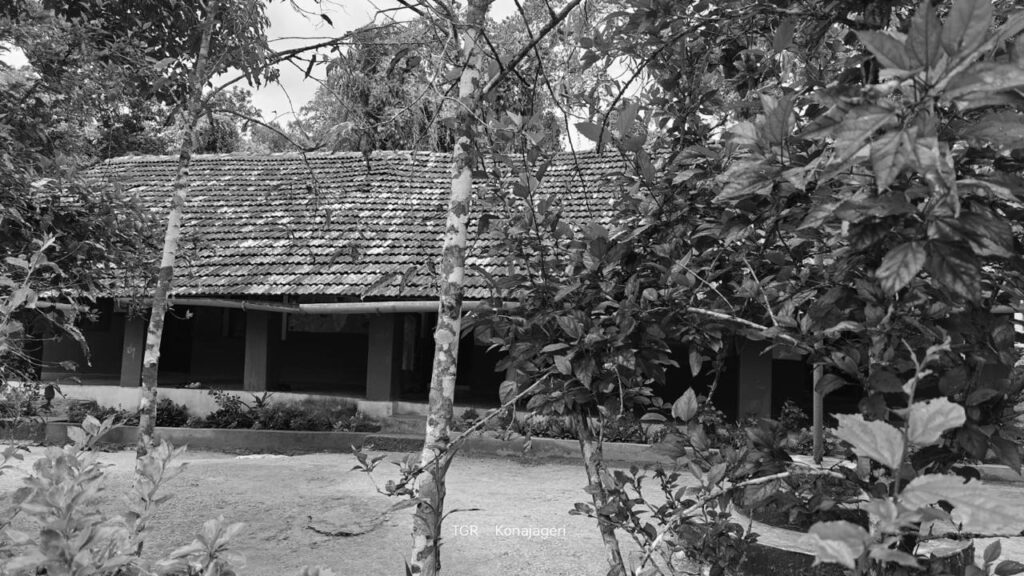I wasn’t born with a silver spoon in my mouth. Having lost my Father when I was just over one year of age, the burden of running the household fell on my Mother, who was partially blind. However, she was educated and a very capable lady.
Paka was a small sub village of Kalagadal. There was a small thatched shed on our family land, which was my school. When I was 7 years of age, in 1940, I started going to school which was 2 ½ kms away, crossing 3 rivers by foot. In 1944, having passed my IV grade, I had to walk 8 kms to Kottur, through dense forest. I remember on one occasion having seen an enormous King Cobra, the likes of which I haven’t seen to date. Even now, I recall telling my Mother that I could face a tiger – but the sight of the King Cobra still terrifies me as a memory.
My Mother provided me with home schooling – an advantage that enabled me to excel in my academics. My distinction encouraged the teachers to entrust me to actually teach full time at school for a year – call it an initiation into my future career!

After my Third Form (8th standard), I spent a year at Napoklu High School and moved to the famous Central School at Madikeri from 1950-52, for my matriculation. The hostel fees being very steep, at Rs 10 per month, I stayed as a guest with various distant relatives and friends of the family.
We had to walk 16 miles to Madikeri for our household needs – always an adventure for a young boy as we had to scale and descend three hills of Bettathur, Madenad and Madikeri.
I started visiting Madikeri in 1941 and my memories of those days are still fresh.
Alongwith our tenant Machaiah, or other neighbours from the village, we used to carry vegetables, chickens, eggs, honey, banana, etc to sell at the market in Madikeri. I used to carry a packed lunch and return home to reach before nightfall.
I was not afraid of anything, except ghosts (!!) and of course Chamundeshwari at Raja seat. It was known even then as “Kund Motte Chowndi“ with several frightening stories about this Goddess being prevalent.
There were a few major attractions in Madikeri that I can distinctly remember:
– Bower Bungalow: Now named Sudarshan Guest House. It was the residence of the Chief Commissioner. Always the British flag (Union Jack) was fluttering. Our elders used to force us to salute the flag !
– The next attraction was the Fort Bell. It used to ring every hour and the sound was audible to the whole town.
– Coronation garden (present Cauvery Hall). Interestingly, at the center of the garden a toy full sized man was standing on one leg and was slowly turning a pipe fixed to the palm of this toy which sprinkled water to make it seem like a fountain.
Of course sharing these innocent stories might seem childish to youngsters these days – but that was what we experienced in those fascinating growing up years.
© Bacharanianda P Appanna
Readers responses have been exceptionally positive and this level of interaction can be maintained with your active contribution of stories, we would be delighted to publish.



At Ukkuda Road, Late Neravanda Thimmaiah Ajja’s home stands to the day. Whenever we visited Coorg, my father used to take me to his house.
Like Appanna Ajja, my Father could not afford the boarding fees and used to stay at Thimmaiah Ajja’s house during his school days.
Like my father, many other distant relatives who could not afford the boarding fees at the Central School or find a place to stay at Madikeri while studying in other schools such as St. Joseph’s High School, were provided shelter, warmth and food by Thimmaiah Ajja.
He never asked for a penny from their parents. If they insisted on paying whatever they could afford, he took the money and made sure that more books and other necessities were purchased and distributed amongst the youngsters staying there.
My father found a job in Bangalore and was always grateful, never forgetting the generosity of Thimmaiah Ajja. He would always visit first Ajja, whenever he visited Coorg to inquire about his health and ask him every time, if he could be of any help.
Thimmaiah Ajja worked hard and was an affluent planter. His constant and proud refrain was his infectious smile and encouraging words – I am happy that you came to visit and to know that you and your family are doing well in Bangalore. I do not need any help. But, if you find any youngsters in our extended family who are struggling to study due to some constraints, help them and I will feel very happy.
This was Kodavaame exemplified – a rarity to find in Nangada Kodagu these days.